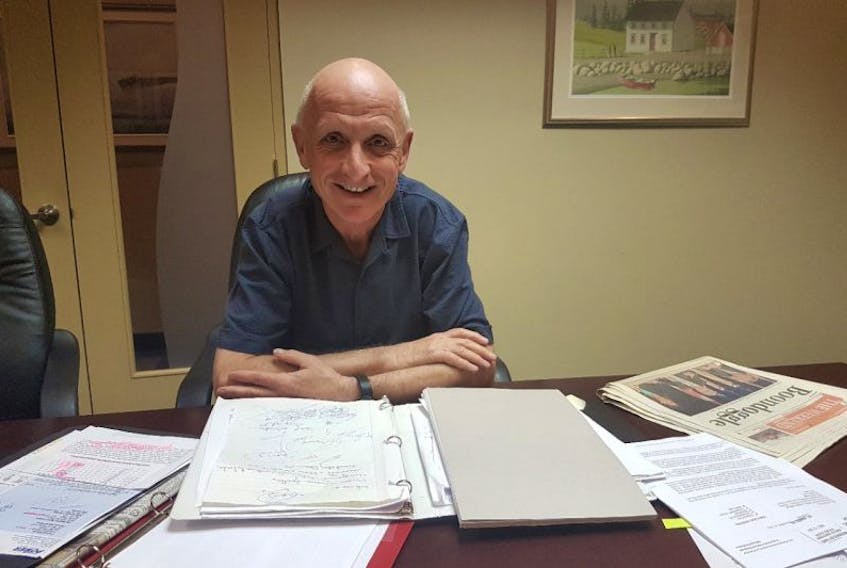What are we going to do when Hydro-Québec comes calling?
(And keep in mind, that call may come sooner than we expect.)

That call is about something that’s not going to happen until 2041 — that’s when the hydroelectric contract between Churchill Falls-Labrador Corporation (CFLCo) and Hydro-Québec will come to an end, and the Quebec utility will no longer be able to reap huge profits on the electricity generated at the Upper Churchill generating station.
That sounds like a long way into the future — except for the fact that, like many businesses, the electricity business likes stability. Just like with Brexit and Britain’s departure from the European Union, the closer to the end things get without any new arrangement (causing a so-called “hard Brexit”), the more nervous customers, suppliers and just about everyone else gets.
Smooth transitions are often in everyone’s interest.
What happens with a hard Churchill Falls exit — admittedly, still 20 years from now — is akin to what happens if one family member gets the bulk of the family farm in the will, but another family member gets the land that has the only driveway by which the farm can be accessed.
CFLCo, (which is 34.2 per cent owned by Hydro-Québec and 65.8 per cent owned by Newfoundland and Labrador Hydro) may end up with far more electric power than it can use and no way to get it to market except through Hydro-Québec’s existing grid. Likewise, Hydro-Québec will still need Churchill Falls, and not just for cheap power.
Hydro-Québec can’t afford to lose the power, and we can’t afford to lose a connection to market.
Churchill Falls is different than the other generating stations in Hydro-Québec’s fleet. As one Hydro-Québec witness put it during a court challenge over the control of water on the river, “Integrating Churchill Falls into their system meant that Hydro-Québec could use the seasonal flexibility of Churchill Falls to reduce its reliance on hydroelectric facilities that became less efficient as their reservoir levels depleted in winter.”
That’s why, for example, the Quebec utility was keen to sign a guaranteed winter availability contract for extra power in 1999 and pay an addition $1 billion over the life of that contract.
So, in some ways, Hydro-Québec can’t afford to lose the power, and we can’t afford to lose a connection to market.
But the split ownership means some interesting things as well. As Newfoundland and Labrador’s Department of Natural Resources pointed out in 2012, “Upper Churchill power is not exclusively owned by the province and Newfoundland and Labrador may consequently not have unfettered control over the resource. There will be no free power available to the province and there will be limited rights to recall power after the power contract expires.”
So, to the negotiating table we go, and likely somewhere well in advance of 2041.
The problem is that the critical lopsided Upper Churchill deal — Quebec has always made the lion’s share of the cash selling power from Labrador — has always been a political football, with some of the biggest winners on that particular gridiron being politicians willing to use anti-Quebec sentiment to drive their own agendas or collect their own votes.
And in politics — at least in the political system we use now — there is no guarantee of anyone with any particular expertise in negotiation or the electrical business being handed the keys.
So here’s an interesting footnote to something happening at the Muskrat Falls inquiry. At the very end of the hearings, the province’s Consumer Advocate, Dennis Browne, slipped a recommendation into his final submission — 120 pages into the 121-page submission.
It’s not something that really fits neatly into the inquiry’s mandate. But it’s not a bad idea — and here it is.
The advocate’s office wrote; “2041 is approaching and there is concern regarding next steps in the process. Therefore, a plan needs to be developed now regarding 2041 negotiations with Hydro-Québec. The Consumer Advocate recommends that a panel — chosen by the Independent Appointments Commission — be established consisting of the necessary experts from the areas of engineering, finance, the law, etc. to prepare for 2041 and to make recommendations to the government as to how to go forward, which may include the panel having discussions directly with Hydro-Québec.”
And for goodness sake, let’s keep maw-mouthed football-kicking politicians out of it.
Russell Wangersky’s column appears in 36 SaltWire newspapers and websites in Atlantic Canada. He can be reached at [email protected] — Twitter: @wangersky.
MORE FROM RUSSELL WANGERSKY
• Now you see it, now you don’t
• Let’s see who’ll make promises on pensions








